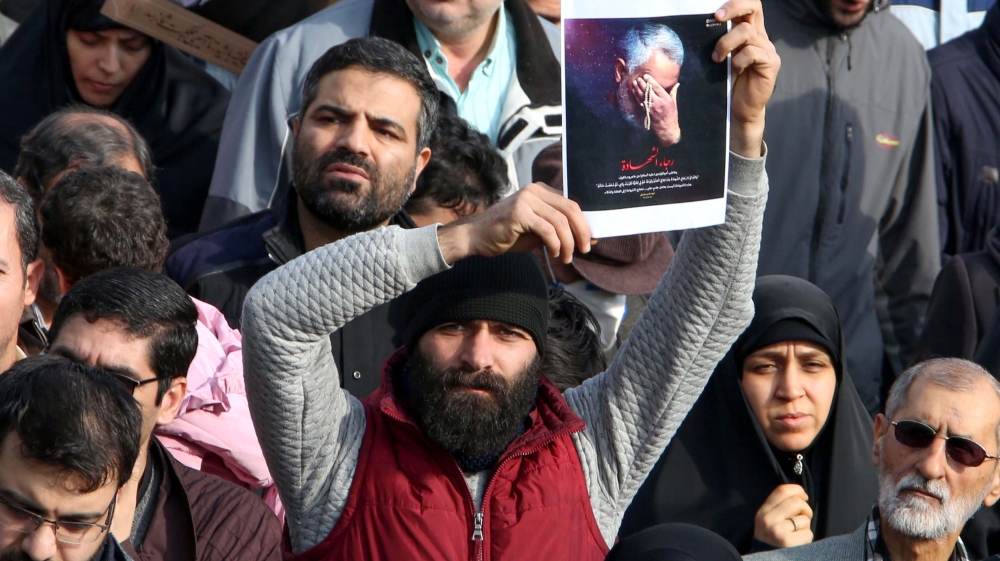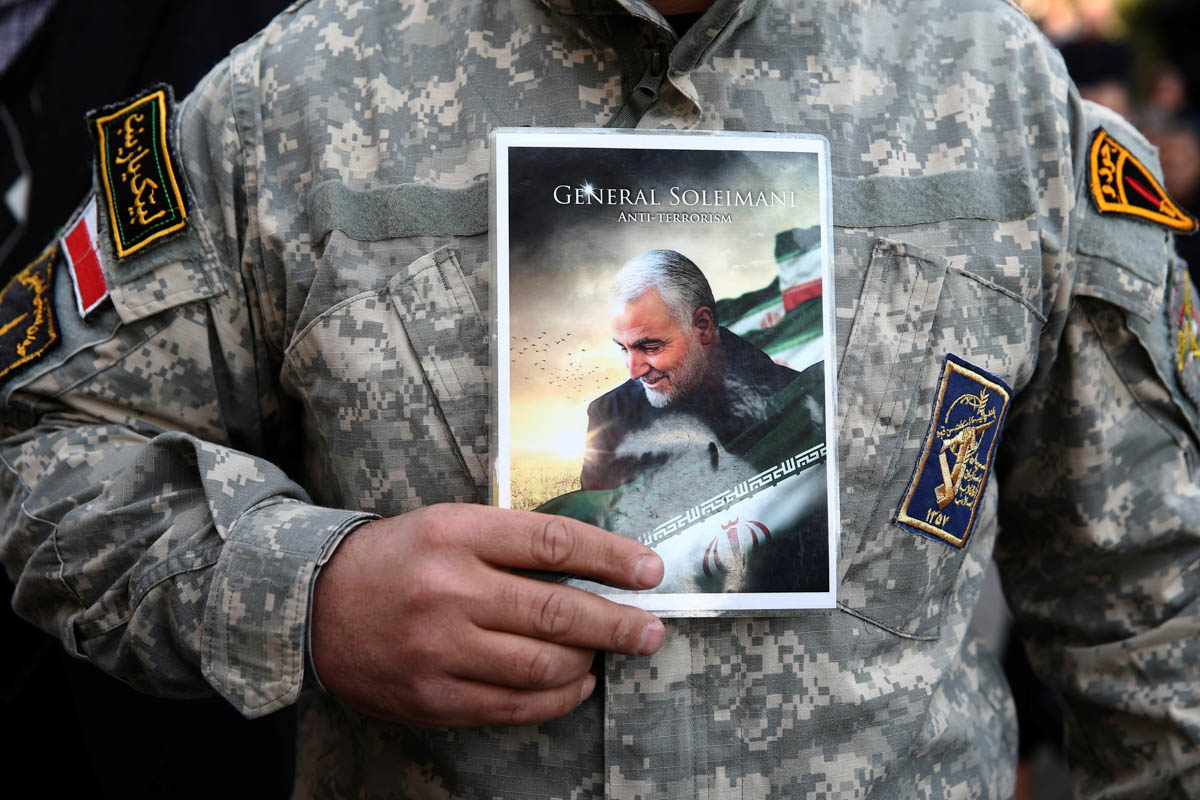Was Trump’s order to assassinate Iran’s Qassem Soleimani legal?
Democrats question whether US president needed congressional approval, while Trump says he was acting in self-defence.

Washington, DC – The US assassination of Iranian military commander Qassem Soleimani, has prompted questions over whether President Donald Trump had the legal authority to order Friday’s killing.
Soleimani, the head of Iran’s elite Quds Force, was killed by US forces in an air raid at Baghdad International Airport. Abu Mahdi al-Muhandis, the deputy commander of Iran-backed militias known as the Popular Mobilisation Forces (PMF), was also killed. Iran has threatened severe retaliation.
Keep reading
list of 3 itemsWho was Iran’s Qassem Soleimani?
Qassem Soleimani assassination: Trump, Pompeo defend decision
The Pentagon said the drone attack came “at the direction of the president”. The defence department statement sought to justify Soleimani’s killing by citing his Quds Force role in the deaths of hundreds of American and coalition service members and the wounding of thousands more in Iraq and Afghanistan.
Trump and his top aides defended the decision as legal within the authority the president has to protect US forces from attack.
Soleimani was planning “imminent and sinister attacks”, Trump told reporters at his Mar-a-Lago resort on Friday.
“But we caught him in the act and terminated him,” he added. “We took action last night to stop a war. We did not take action to start a war.”
Without elaborating, US Secretary of State Mike Pompeo also said Soleimani was planning “imminent” action against American lives.

But top Democrats question whether Trump needed to seek congressional approval for the raid.
“It’s debatable whether there was legal justification for this strike,” Democratic Senator Chris Murphy said in a news conference on Friday.
“This is the equivalent of the Iranians assassinating the US secretary of defence. If the Iranians were to assassinate the US secretary of defence we would consider that an act of war and we would respond disproportionately,” Murphy said.
The answer largely depends on the facts the Trump administration based its decision – facts that may never be made public.
US president may use force, short of war, to protect American interests as the commander-in-chief under Article II of the Constitution, said Bobby Chesney, a professor at the University of Texas School of Law who specialises in national security issues.
“If the facts are as the defence department said, then the president relatively clearly has Article II authority to act in self-defence of American lives,” Chesney told The Associated Press news agency.
Escalation
But some analysts and US members of Congress said Trump appears to be crossing the line put forth in the 1973 War Powers Act, by risking a major escalation with Iran. The landmark legislation says that sustained hostilities that put US forces in harm’s way require prior approval by Congress.
“Middle East wars don’t happen by accident,” said Aaron David Miller, a senior fellow at the Carnegie Endowment for International Peace in Washington, DC.
“They are preceded by actions, misperceptions until one side takes a new step that elevates things to a new level and that is essentially what the assassination of Soleimani means,” Miller told Al Jazeera.
“The new place that we are in is that the shadow war is over,” he said. “This raised the stakes considerably beyond the pattern of tit-for-tat that has governed the Iran-Israel relationship and the Iran-US relationship for years.”

Congress has passed two authorisations for use of military force for wars against al-Qaeda in 2001 and Iraq in 2002.
Both the Trump administration and the previous Obama administration claimed authority to attack the ISIL (ISIS) group in Syria and Iraq under the 2001 authorisation, launched the US’s so-called global “war on terror”.
But Congress has not authorised military action against Iran and national security experts said the prior authorisations cannot be construed to cover a new war.
“We do need a new authorisation,” said Lawrence Korb, a senior fellow at the Center for American Progress, a think-tank allied with the Democratic Party.
“We can’t rely on what was passed back in 2001 and say that justifies what the president has done,” Korb, also a former assistant secretary of defence, told Al Jazeera.
Would Congress back Trump?
Whether Congress would back Trump in a war with Iran is highly uncertain. As tensions between the US and Iran flared in 2019, Democrats in the House of Representatives voted to prohibit the Trump administration from taking any military action against Iran. That provision was dropped from defence legislation in a conference with the Republican-led Senate.
Further, with an impeachment trial looming in the Senate and the 2020 election just 10 months away, the Trump administration already faces a credibility problem in Congress. Democrats on Friday called for an immediate explanation of the president’s decision and raised doubts about Trump’s strategy versus Iran.
“I’m deeply concerned about the dangers of a costly long-term, military confrontation with Iran,” said Democratic Senator Richard Blumenthal.
“This action has the effect of destabilising an already unstable area of the world,” Blumenthal told reporters on Friday.
With most senators yet to return to Washington, DC, from the holiday recess, US Senate Majority Leader Mitch McConnell said Trump administration officials would brief staff aides on Friday. There will be a second briefing for senators when they return next week, the Republican leader said.

Trump ally and prominent US Senator Lindsey Graham thanked the president for the decision.
“Thank you, Mr. President, for standing up for America,” Graham tweeted.
McConnell called Soleimani “Iran’s master terrorist”.
“The architect and chief engineer of the world’s most active state sponsor of terrorism has been removed from the battlefield at the hand of the American military,” McConnell said.
But analysts and anti-war advocates disputed that rationale as a legal basis for the military action.
“The fact that the United States designated Qassem Soleimani on its own unilaterally as a foreign terrorist does not give the United States, in law or in practice, the right to kill him,” said Hillary Mann Leverett, a political risk consultant and former director of Iran affairs at the White House’s National Security Council.
“In US law, it gives the United States the right to seize his assets, but not to kill him,” Leverett, told Al Jazeera.
Medea Benjamin, the founder of anti-war advocacy group CodePink, called the assassination of Soleimani flatly illegal.
“I can’t imagine even any iota of legality when this has nothing to do with the fight against ISIS,” which is why US troops are in Iraq, Benjamin told Al Jazeera.
“The reality is the US troops have been in Iraq, doing illegal work against US law and the Iraqi constitution that we helped write,” Benjamin said. “The killing of the most powerful military-political person in Iran is such an obvious move to war you would have to be an even bigger idiot that Trump, not to recognize, this is war.”
CodePink and the ANSWER Coalition are organising anti-war rallies in more than 30 US cities set for Saturday night calling for the withdrawal of US troops from Iraq.
US media, citing defence officials, reported on Friday that the US is sending 3,000 additional troops to the Middle East to provide a rapid response force to protect against further threats.